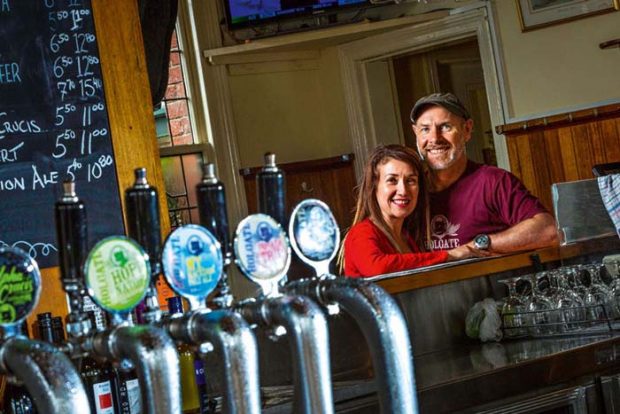Students get a taste for brewing
Brewer Paul Holgate is quite emphatic. The new subject he helps teach at the University, An Introduction to Beer Styles, does require students to swallow, not spit.
“It’s the only way,” he says. “The only way! This is what we do in beer judging to understand style and a beer’s characteristics. To get the full hop or bitter sensation on the back of the tongue, you need to swallow the beer.”
The higher the percentage of hops the more bitter the beer, but students need to keep in mind that bitterness can be offset by the sweetness of malt, which helps determine a beer’s flavour and style. Tasting the beer will tell a drinker all about that.
An Introduction to Beer Styles and Sensory Analysis and Principles of Brewing – two breadth subjects introduced this year by the Faculty of Veterinary and Agricultural Sciences – cover a fair bit of beer-making and drinking territory, with help from Paul and Natasha Holgate, of Holgate Brewhouse in Woodend, 70 kilometres north-west of Melbourne.
Paul is a guest lecturer in the highly popular Beer: Theory and Craft subjects, which teach a range of skills to would-be beer-makers. It’s a chance for students to learn about a fast growing industry from real-world professionals.
For the Holgates, the subjects mark a return to their old stomping ground. The couple met in the University’s chemistry library in 1987. Both were chemistry majors (BSc(Hons) 1989), who went on to work in the chemical industry before Paul decided to take his enthusiasm for home brewing and turn it into a business.
“To get the full hop or bitter sensation on the back of the tongue, you need to swallow the beer.”
The couple moved to Woodend and began selling beer they made in a backyard shed. Eventually, they left their corporate careers to concentrate on their passion. The timing was perfect.
By 2002, when the Holgates bought an old hotel (circa 1896) in Woodend’s main street, interest in the craft-brewing movement, which had begun in the US and Britain, was taking off in Australia.
It has been portrayed as a kind of grassroots rebellion against the dominance of big, multinational brewers. Paul says “craft brewing”, a term that has been bastardised by big breweries, requires time, attention to detail and quality ingredients.
It has proved to be a winning formula for Holgate Brewhouse, which has since expanded to a restaurant and hotel, with a showroom and beer discovery centre in the works. The Holgate brews sell in bars, pubs and outlets across Australia.
Subject coordinator Dr Charles Pagel, a lecturer in veterinary and agricultural sciences and an avid home brewer himself, says the study of craft brewing fits well with other University subjects in wine-making and viticulture.
“Breadth subjects allow students to learn about something they’re interested in from outside the core disciplines of their degree,” he says. “Many of the students I have talked to are interested in the recent rise of the craft-brewing movement, and are keen to learn more about brewing and even to get their hands dirty and have a go themselves.”
Dr Pagel says enrolments in the subject have been high, prompting him to move classes to a bigger lecture theatre and to add more practical sessions. Students will learn the skills to brew good-quality beer, with additional lectures in biochemistry, agriculture, sustainability and marketing.
Meanwhile, Paul and Natasha’s daughter, Emily, is now at the University studying a Bachelor of Arts. She has yet to say whether she will follow in her parent’s beer-brewing footsteps.
“I think she would know a lot more about beer than regular kids her age,” says Paul. “We’ll wait and see. Let her enjoy uni first.”
Exclusive 3010 offer for alumni:
Holgate Brewery is offering an exclusive tour and tasting for 15 readers.



